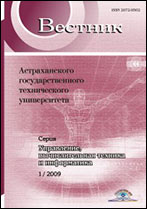|
MATHEMATICAL MODELING
Fuzzy linear programming problems in motivated systems
G. P. Vinogradov, V. N. Bogatikov, V. N. Kuznetsov
Tver State Technical University,
Tver, Russian Federation
Abstract:
The paper presents an approach to solving the problem of agent selection model, where the agent endogenously forms the goals of its behavior. The approach involves the development of decision-making methods, taking into account the relationship of motivation with the desire of the agent to implement subjectively understood interests and the state of the environment. The environment exists only in the mind of the agent in the form of a symbolic model based on the information perceived from the sensors. It serves as a basis for the agent's understanding of the current situation and subsequent choice of the method of action. Desire of the agent to strengthen the confidence in feasibility of the method of action and possibility of achieving the desired state requires to use the procedures for forming a model-representation based on the measured values of the state of the environment. There are considered the cases of applying the methods of the possibility theory for modeling reality with an artificial or natural entity based on the perception of facts, existing knowledge, memory, judgments and hypotheses.
Keywords:
motivation, fuzzy linear programming, goal-oriented agent, set, model space, fuzzy judgment, choice situation.
Received: 30.07.2019
Citation:
G. P. Vinogradov, V. N. Bogatikov, V. N. Kuznetsov, “Fuzzy linear programming problems in motivated systems”, Vestn. Astrakhan State Technical Univ. Ser. Management, Computer Sciences and Informatics, 2019, no. 4, 131–140
Linking options:
https://www.mathnet.ru/eng/vagtu608 https://www.mathnet.ru/eng/vagtu/y2019/i4/p131
|

|




 Contact us:
Contact us: Terms of Use
Terms of Use
 Registration to the website
Registration to the website Logotypes
Logotypes








 Citation in format
Citation in format 